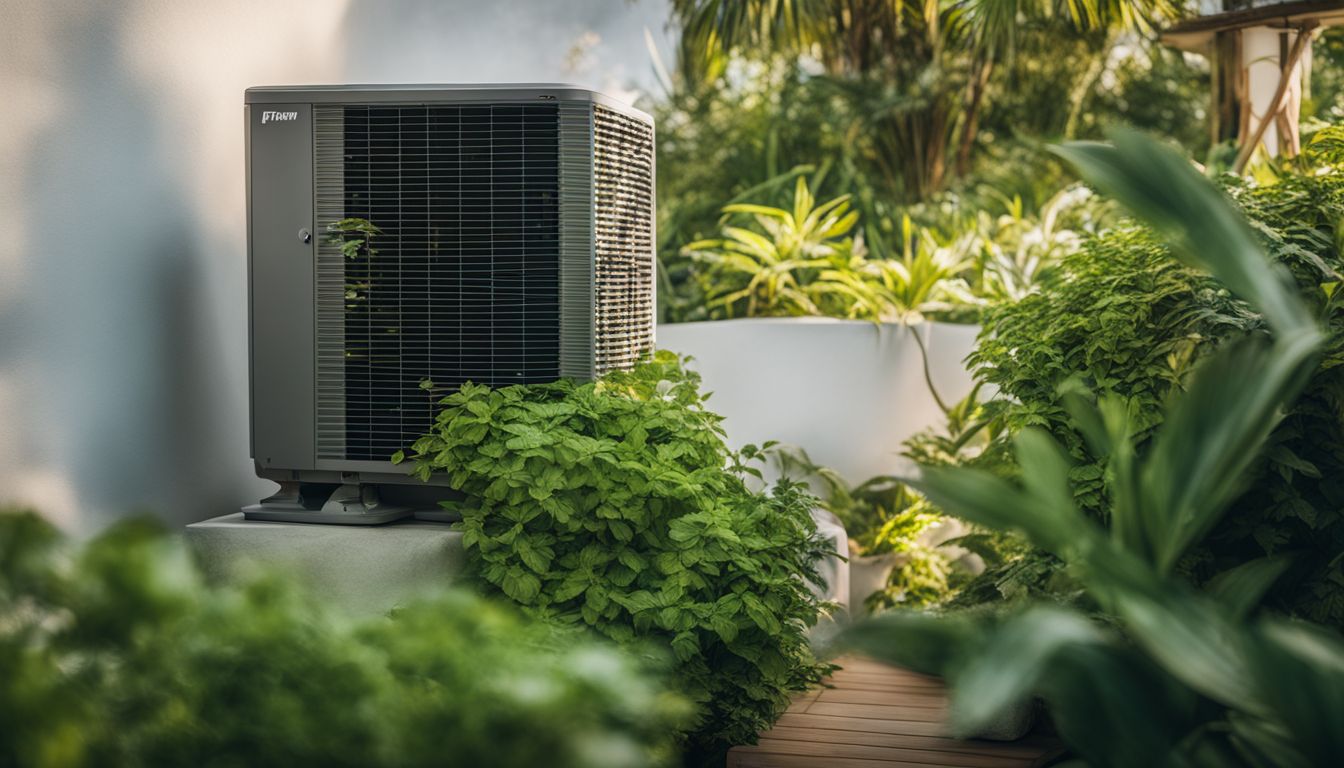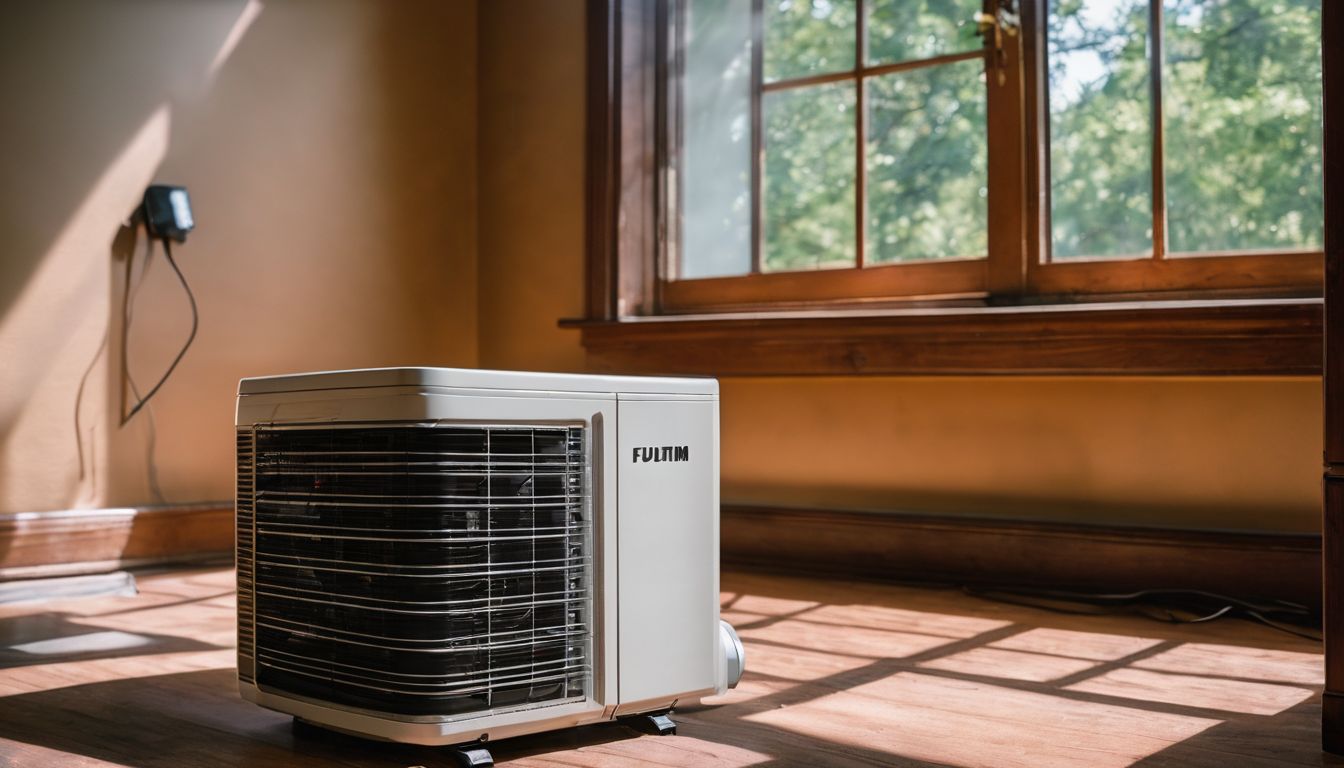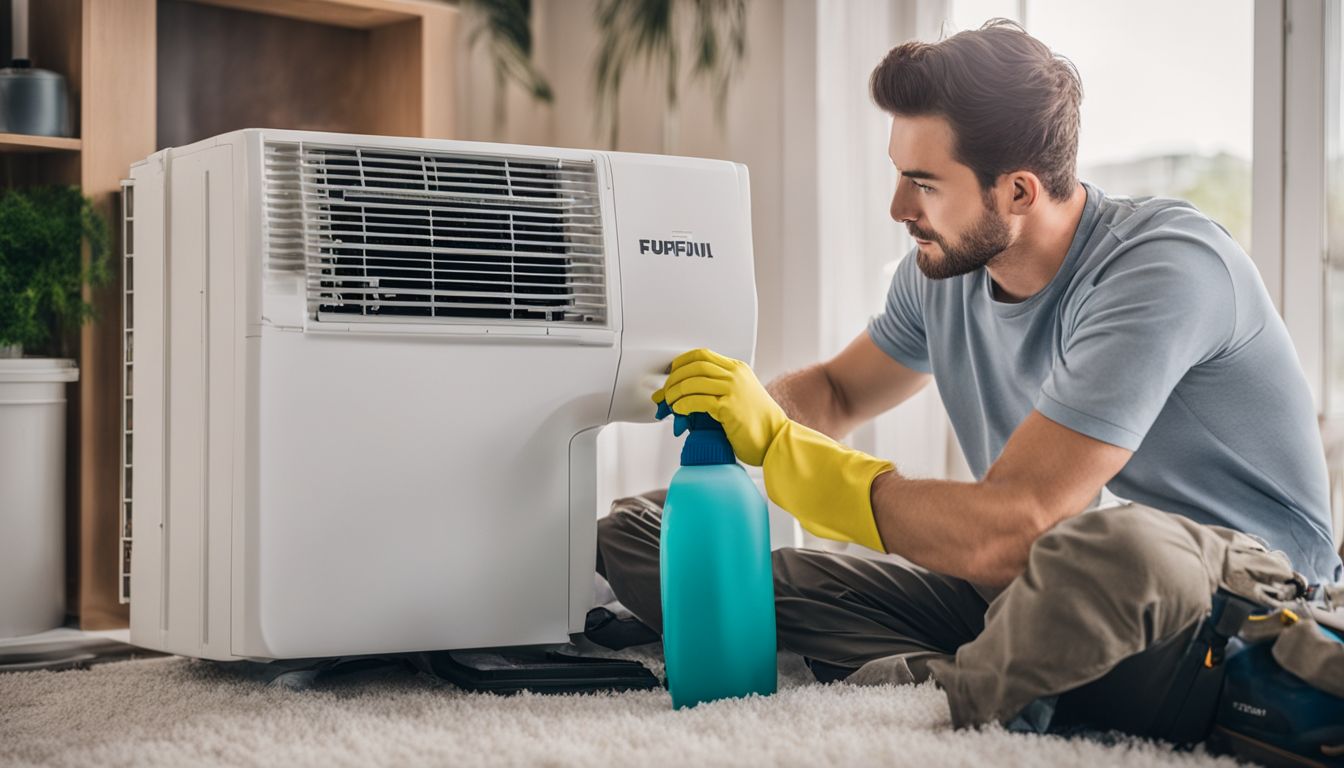Are you tired of your air conditioning unit turning on and off more often than it should? Frequent on-off cycles in an AC can lead to inefficient operation and higher energy bills.
This article will guide you through the reasons behind this erratic behaviour and offer practical solutions to get your system running smoothly again. Keep reading to learn how you can fix these annoying hiccups and improve your indoor comfort.
Understanding AC Short Cycling
Understanding AC Short Cycling involves recognising the phenomenon where an air conditioning unit frequently turns on and off in rapid succession. This erratic operation signals potential issues within your cooling system that merit swift attention to maintain efficiency and prolong lifespan.
Definition and explanation
Short cycling is a common issue where your air conditioner kicks in and out more often than it should, not completing its full cooling cycle. This can cause wear on the components like compressors and expansion valves, leading to potential damage over time.
Instead of maintaining a steady, energy-efficient rhythm that keeps your indoor environment comfortable, the system rapidly switches between on and off states. This erratic behaviour strains the air conditioning unit’s mechanism, increasing your energy bills while failing to cool your space properly.
Addressing short cycling is crucial for prolonging the life of an air conditioning system. It involves examining various aspects such as refrigerant levels, condenser coil condition, and appropriate sizing of the unit itself.
If left unchecked, frequent on-off cycles could shorten an AC’s lifespan dramatically and disrupt temperature regulation in your home or office. Regular maintenance checks can prevent this problem by ensuring all parts are in good order so that your climate control works effectively without consuming excess power or contributing undue greenhouse gas emissions to combat climate change.
Common Causes of AC Short Cycling
Discover the root causes behind your air conditioner’s frequent starts and stops, a behaviour that not only disrupts comfort but can significantly impact energy efficiency; continue reading to unveil common culprits and how they may affect your system.
Thermostat Issues
Thermostat problems can trick your air conditioning system into short cycling, which hampers efficiency and puts extra strain on the unit. If your thermostat is in the wrong spot, near windows or doors where drafts are common, it might not read indoor temperatures correctly.
This misplacement leads to frequent on-off cycles as it tries to adjust the room temperature based on inaccurate readings.
A faulty wiring connection to your thermostat controls may also cause erratic air conditioner behaviour. It’s essential that thermostats receive correct voltage levels; otherwise, they can send out incorrect signals to your AC system, resulting in short cycling.
Regular checks on these connections help maintain energy conservation and prevent unnecessary wear on components such as condenser coils and evaporator coils. Fixing these issues promptly ensures efficient energy usage and prolongs the lifespan of your AC unit.
Clogged Air Filters
Clogged air filters in your air conditioner can trigger a host of problems, short cycling being one of the most common. The meshwork designed to trap dust and debris gets filled up over time, choking the regular flow of air.
This blockage makes it tough for the AC unit to suck in enough air to keep its components cool and functioning properly. As a result, parts may overheat or freeze, forcing your system into an inefficient cycle of turning on and off repeatedly.
Regularly replacing or cleaning out these filters is crucial for maintaining proper airflow within your A/C system. Neglecting this simple maintenance task not only leads to reduced energy efficiency but also increases energy consumption as the system struggles to operate with a dirty filter.
Moreover, clean filters are key contributors to prolonging the lifespan of an AC unit by preventing unnecessary strain that could lead to costly breakdowns or repairs later on. So, ensure your air conditioning systems breathe easy with clear filters—it’s an easy step towards reliable cooling and long-term savings.
Refrigerant Leaks
Refrigerant leaks spell trouble for your air conditioner and are a leading cause of short cycling. If refrigerant levels dip due to a leak, the AC system loses its cooling mojo, making it turn on and off more than usual.
This not only consumes more energy but also puts extra strain on the compressor, which is bad news for both your wallet and the lifespan of your unit.
Fixing these leaks is crucial to keeping your air conditioner running smoothly. A well-sealed system maintains optimal performance and helps conserve energy, reducing those pesky carbon emissions.
It’s important to catch leaks early; if ignored, they can lead to serious damage or even complete failure of the AC system. Remember that a healthy level of refrigerant ensures efficient operation and keeps energy consumption in check.
Incorrect AC Size
Choosing the right size for your air conditioner is crucial. An oversized unit can cool a room quickly but will turn on and off more often, wearing out its components. This constant cycling can lead to high energy bills as the system uses maximum power each time it starts up.
It also means your AC might need frequent repairs, shortening its overall lifespan.
A properly sized air conditioning system helps in reducing energy consumption and maintaining comfort levels. If you’ve got an oversized AC, it’s working harder than necessary and not dehumidifying effectively.
The result is a clammy environment that leads to wasted energy-saving potential and sustainability goals being missed. To avoid these issues, ensure your AC’s capacity matches the demands of your space.
Electrical Problems
Electrical problems in air conditioners often stem from issues with internal wiring. Damaged or loose wires can interrupt the power flow, leading to erratic performance and short cycling.
This constant on-and-off pattern strains your a/c system and increases energy consumption, negatively impacting your bills and your unit’s lifespan.
A bad compressor exacerbates electrical woes within an AC unit by overheating after each start-up attempt, prompting an automatic shutdown to prevent damage. Electrical connections need regular checks to ensure they are secure, as a flimsy connector might be all it takes to throw off the entire operation of your cooling system.
Regular maintenance of capacitors and circuit boards is crucial in keeping these complex systems running smoothly while helping reduce energy costs and carbon footprint for more environmentally friendly living conditions.
Frozen Evaporator Coils
Frozen evaporator coils can wreak havoc on your air-conditioning system. They stem from a lack of proper airflow through the coils, often because dirt and debris build up over time.
This accumulation blocks air that would otherwise keep the coils at the right temperature, leading to ice formation. Regular cleaning of these vital components is crucial for maintaining efficient operation and avoiding interruptions in cooling.
If you notice your A/C unit struggling or shutting down unexpectedly, check for icy build-up around the evaporator coils. Dirty filters are frequent culprits here; they restrict airflow and reduce energy consumption efficiency by forcing your system to work harder than necessary.
Keeping an eye on refrigerant levels also helps prevent coil freezing since low refrigerant can lead to decreased heat absorption and subsequent ice issues. Prompt attention to these signs will help prevent long-term damage to your A/C system and ensure it runs smoothly.
Troubleshooting Solutions for AC Short Cycling
Tackling frequent on-off cycles in your AC system requires a methodical approach to identify and address underlying issues. Our troubleshooting steps will guide you through practical solutions that restore efficiency, ensuring your unit operates smoothly without unnecessary energy waste.
Thermostat adjustment
To prevent short cycling and reduce energy consumption, it’s crucial to adjust the thermostat correctly. A faulty thermostat can trigger your a/c system to turn on and off more often than necessary, wasting energy and straining the unit.
Ensure your thermostat is properly calibrated; even small discrepancies can cause significant issues. If your device frequently overshoots the target temperature, it might be time for a tune-up or replacement.
Place your thermostat away from drafts, direct sunlight, and other heat sources to avoid false readings that lead to HVAC short cycling. Regular checks ensure that they measure room temperatures accurately and control the air handler effectively.
Simple adjustments to its location can have a big impact on how well your AC operates, contributing to both energy savings and extended equipment lifespan.
Air filter cleaning
Keeping your AC’s air filter clean is crucial for preventing short cycling. Dirty filters obstruct airflow, causing your system to work overtime and shut off prematurely. Make frequent cleaning or replacement of air filters a part of your regular maintenance routine.
Ideally, tackle this task every two weeks to ensure smooth operation and to reduce energy consumption.
Ensuring that the air filter in your A/C system is free from dirt and blockages promotes proper airflow throughout the unit. This simple step can help avoid potential overheating issues caused by restricted circulation.
Clean filters support the efficient functioning of motors and other critical components within your HVAC system, upholding energy saving practices and environmental responsibility.
Refrigerant check and refill
Checking the refrigerant level is a key step in maintaining your A/C system and ensuring it runs efficiently. Low levels can lead to short cycling, making your unit turn on and off more often than it should.
This not only reduces energy consumption efficiency but also puts extra strain on the compressor, possibly leading to an overheated component. If you suspect a leak or notice your AC isn’t cooling as effectively, it’s time to inspect the refrigerant.
Refilling the refrigerant must be done with care and precision. An HVAC professional will locate any leaks, repair them, and refill your system with the appropriate type of refrigerant.
It’s crucial that they add just the right amount—too much or too little could compromise performance or damage your air conditioner. Regular checks for leaks and timely refills help keep short cycling at bay while preserving your unit’s lifespan and operational effectiveness.
When to Consider Professional AC Services
Sometimes, the complexities of AC issues extend beyond DIY fixes, calling for expert intervention to ensure proper function and maintain system integrity.
Trusting professional technicians becomes essential when specialised skills or certifications are needed for accurate diagnostics and sustainable repairs.
Aircon chemical wash
An aircon chemical wash thoroughly cleans your A/C system, ensuring it runs smoothly and efficiently. This deep clean removes stubborn dirt, mould, and bacteria that can cause foul smells and hinder performance.
It’s a vital step to keep your air conditioner in top shape, helping to cut down on energy use and reduce the need for costly repairs.
Technicians perform this service by carefully dismantling key components of the A/C unit. They then apply a specialised cleaning solution that breaks down grime and build-up without harming the system’s delicate parts.
By restoring optimal airflow and cooling capacity, a chemical wash not only prolongs the life of your air conditioner but also contributes to a healthier indoor environment. Regular maintenance like this keeps future problems at bay, making sure your AC unit is reliable during hot weather spells.
Electrical repairs
Frequent on-off cycling in your AC unit might be waving a red flag for electrical repairs. Such issues often stem from fuse-related problems that disrupt the entire system, sparking a chain of electrical complications.
Ignoring these signs could lead to more severe damage and hefty repair costs down the line.
Electrical fixes are key not only for smooth operation but also for energy efficiency and comfort. Skilled technicians use tools like digital multimeters to pinpoint resistance problems or faulty conductance in components like run capacitors and relays.
They ensure everything from the serpentine belt to the electromagnetic clutch operates without a hitch, bolstering your air conditioning’s performance while keeping energy consumption low.
Conclusion

In the quest to maintain a comfortable home environment, understanding your AC’s frequent on-off cycles is crucial. Take action when you notice such patterns; it could save you money and extend your air conditioner’s life.
Remember, an efficient AC not only cools your space but also contributes to energy conservation. Keep a keen eye on how your unit functions – it might reveal the secret to a cooler, eco-friendly home.
Don’t overlook these signs; they are key to achieving optimal performance from your cooling system.
FAQs
1. Why does my A/C system keep turning on and off?
Your A/C system might be experiencing frequent on-off cycles due to a dirty air duct, an issue with the clutch plate or other components like the piston or throttle body needing auto repair.
2. Can frequent on-off cycles of my A/C impact energy consumption?
Yes, when your A/C unit turns on and off too often, it can lead to increased energy use instead of saving power and reducing energy consumption.
3. What should I do if I suspect my heat pump is causing the A/C to cycle frequently?
If you think your heat pump is at fault, consider having a professional check for ground leaks or problems with related parts such as desiccants that may need rectifying.
4. Are there eco-friendly ways to address my A/C’s frequent cycling problem?
Absolutely! Seeking repairs that focus on eco-friendly solutions can help ensure compliance with environmental standards while solving issues that cause cycling in order to save fossil fuels and protect ecology.
5. Where can I learn more about fixing frequent on-off cycles in a/c systems?
Online communities offer valuable insights where people share tips about fixing common problems including those with water heaters connected to their pumps which could affect your air conditioning unit’s behavior.





